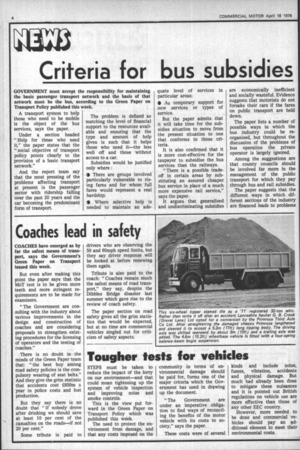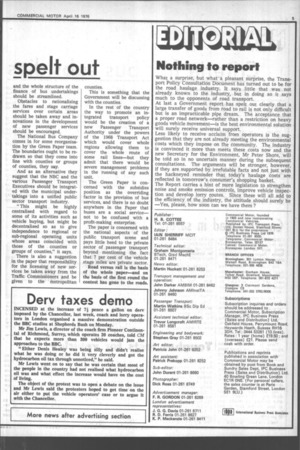Criteria for bus subsidies spelt out
Page 6

Page 7

If you've noticed an error in this article please click here to report it so we can fix it.
GOVERNMENT must accept the responsibility for maintaining the basic passenger transport network and the basis of that network must be the bus, according to the Green Paper on Transport Policy published this week.
A transport system to help those who need to be mobile is the object of the bus services, says the paper.
Under a section headed " Help for those who need it," the paper states that the "social objective of transport policy points clearly to the provision of a basic transport network."
And the report team say that the most pressing of the problems affecting transport at present is the passenger sector with ridership falling over the past 20 years and the car becoming the predominant form of transport. The problem is defined as matching the level of financial support to the resources available and ensuring that the type and amount of help given is such that it helps those who need it—the less well off and those without access to a car.
Subsidies would be justified only where : There are groups involved particularly vulnerable to rising fares and for whom full fares would represent a real hardship; Where selective help is needed to maintain an ade quate level of services in particular areas; a As temporary support for new services or types of service.
But the paper admits that it will take time for the subsidies situation to move from the present situation to one that conforms to those criteria.
It is also confirmed that it is more cost-effective for the taxpayer to subsidise the bus services than the railways. " There is a possible tradeoff in certain areas by substituting an assured cheaper bus service in place of a much more expensive rail service," says the paper. It argues that generalised and undiscriminating subsidies are economically inefficient and socially wasteful. Evidence suggests that motorists do not forsake their cars if the fares on public transport are held down.
The paper lists a number of possible ways in which the bus industry could be reorganised, but throughout the discussion of the problems of bus operation the private operator is largely ignored.
Among the suggestions are that county councils should be involved far more in the management of the public transport for which they pay through bus and rail subsidies. The paper suggests that the different ways in which different sections of the industry are financed leads to problems and the whole structure of the finance of bus undertakings should be streamlined.
Obstacles to rationalising the fares and stage carriage services over certain areas should be taken away and innovations in the development of new passenger services should be encouraged.
The National Bus Company comes in for some reorganisation by the Green Paper team. The boundaries ought to be redrawn so that they come into line with counties or groups of counties, they say.
And as an alternative they suggest that the NBC and the various Passenger Transport Executives should be integrated with the municipal undertakings into a unified public sector transport industry.
"This might be highly centralised with regard to some of its activities such as vehicle buying, but might be decentralised so as to give independence to regional or sub-regional operating units whose areas coincided with those of the counties or groups of counties," it says.
There is also a suggestion in the paper that responsibility for the licensing of new services be taken away from the Traffic Commissioners and be given to the metropolitan counties.
This is something that the Government will be discussing with the counties.
In the rest of the country the way to promote an integrated transport policy would be the creation of a new Passenger Transport Authority under the powers of the 1968 Transport Act which would cover whole regions allowing them to cover the whole route of some rail lines—but they admit that there would be severe management problems in the running of any such unit.
The Green Paper is concerned with the subsidies position as the overriding factor in the provision of bus services, and there is no doubt anywhere in the Paper that buses are a social service— not to be confused with a profit-making enterprise.
The paper is concerned with the national aspects of the public transport scene and pays little heed to the private sector of passenger transport beyond mentioning the fact that 7 per cent of the vehicle stage miles are private sector.
Road versus rail is the basis of the whole paper—and on the basis of the first round the contest has gone to the roads




























































































